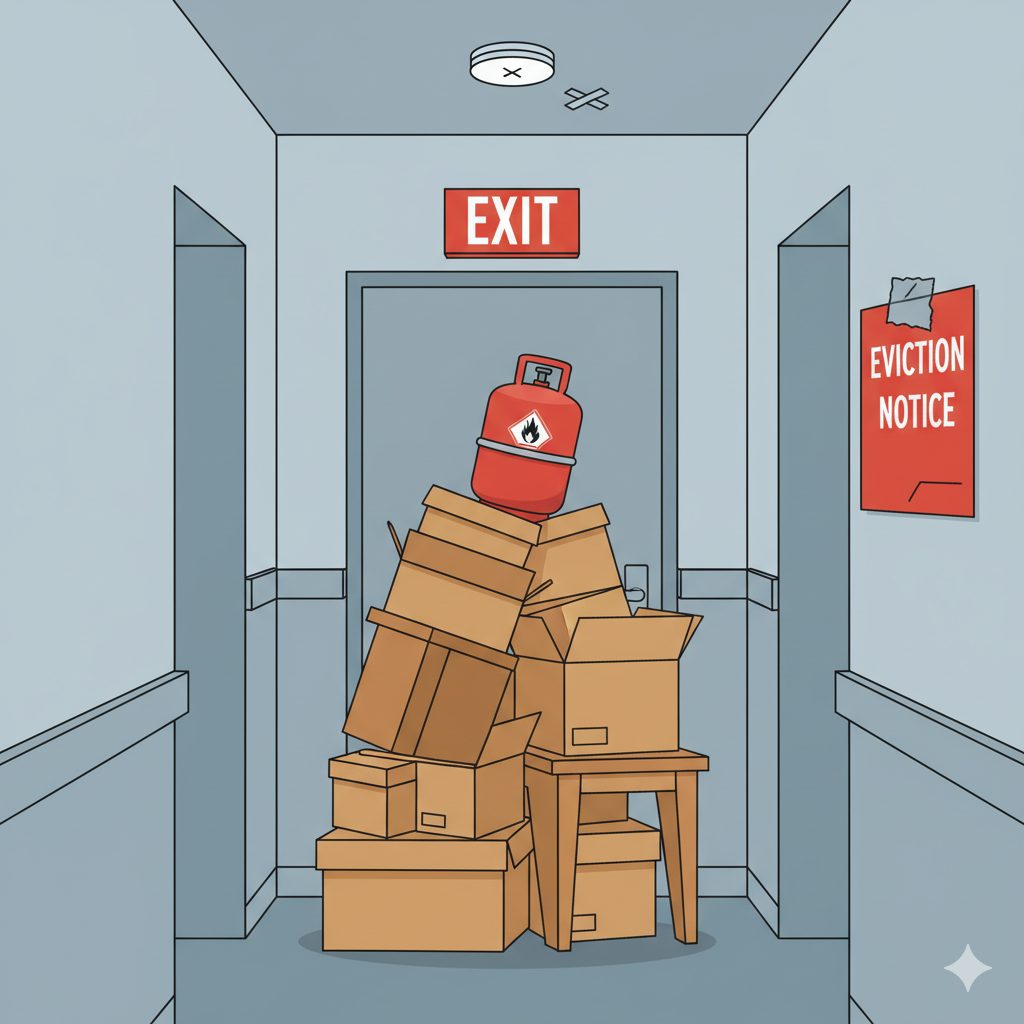Understanding Shared Responsibility Between Landlord and Tenant — and When a Fire Code Violation Can Lead to Eviction
Fire safety in Ontario isn’t just about avoiding fines — it’s about protecting lives and property. Both landlords and tenants have responsibilities under the Ontario Fire Code, and when these responsibilities are ignored, the consequences can include significant fire code offences and even tenant eviction.
Ontario’s Fire Safety Framework
Ontario’s fire safety laws rest on two key pillars:
Together, these establish the province’s rules for fire safety and assign liability for fire code violations. The Fire Code applies to all property types and outlines clear standards for landlords and tenants.
Fire Code and Landlords
Under the Ontario Fire Code, unless otherwise specified, the owner (landlord) is responsible for carrying out the provisions of the Code.
Section 20 of the Residential Tenancies Act (RTA) further requires landlords to maintain residential complexes, including rental units, in good repair and in compliance with health, safety, and maintenance standards.
Landlords must:
- Comply with the Fire Code’s technical and operational requirements.
- Maintain fire safety systems, including fire alarms, sprinklers, extinguishers, emergency lighting, and smoke/CO detectors.
- Prepare and update the property’s fire safety plan.
- Train and supervise staff on fire safety procedures.
- Regularly inspect and test systems to identify hazards or breaches.
Fire Code and Tenants
While tenants do not have the same active maintenance obligations, they are still responsible for not violating fire safety laws. Many Fire Code offences occur when tenants neglect passive but essential duties that keep everyone safe.
Tenants must not:
- Remove or tamper with smoke or CO alarm batteries.
- Cover or disable detectors or alarm systems.
- Block or obstruct hallways, exits, stairwells, or fire escapes.
- Store flammable items such as propane or gasoline in units or common areas.
- Obstruct balconies, windows, or exterior exits that may be used for evacuation.
Tenants must:
- Use safe electrical devices and avoid overloading outlets.
- Follow evacuation rules in the fire safety plan.
- Participate in required fire drills.
- Report fire safety issues, such as defective alarms, to the landlord immediately.
Can a Tenant Be Evicted for a Fire Code Violation?
Yes. The Fire Protection and Prevention Act allows for severe penalties for Fire Code offences — up to $50,000 for a first offence. More importantly, when a tenant’s actions endanger others or interfere with the reasonable enjoyment of the property, tenant eviction may be justified.
For example, in a case handled by Spectrum Paralegal, the Landlord and Tenant Board found:
“The Tenant’s act of storing property in common areas and blocking fire escape routes substantially interferes with the Landlord’s and other tenants’ reasonable enjoyment of the property. Blocking emergency exits and storing combustible material in open containers seriously impairs people’s safety at the residential complex.”
This ruling clearly demonstrates that a Fire Code violation can result in eviction when safety is compromised.
Eviction Process for Fire Code Offences
- Notice to terminate the tenancy.
- Application to the Landlord and Tenant Board (LTB) for eviction.
- LTB hearing to issue an eviction order.
Get Help from a Toronto Paralegal
If you’re a landlord or tenant dealing with Fire Code violations, Fire Code offences, or Tenant Eviction matters, contact Spectrum Paralegal.
Our Toronto Paralegal has experience assisting clients before the Landlord and Tenant Board and Provincial Offences Court in matters related to fire safety and residential tenancy. We can help you protect your rights — and your property.
Contact Spectrum Paralegal today for trusted advice and representation in Ontario tenancy and fire safety matters.







